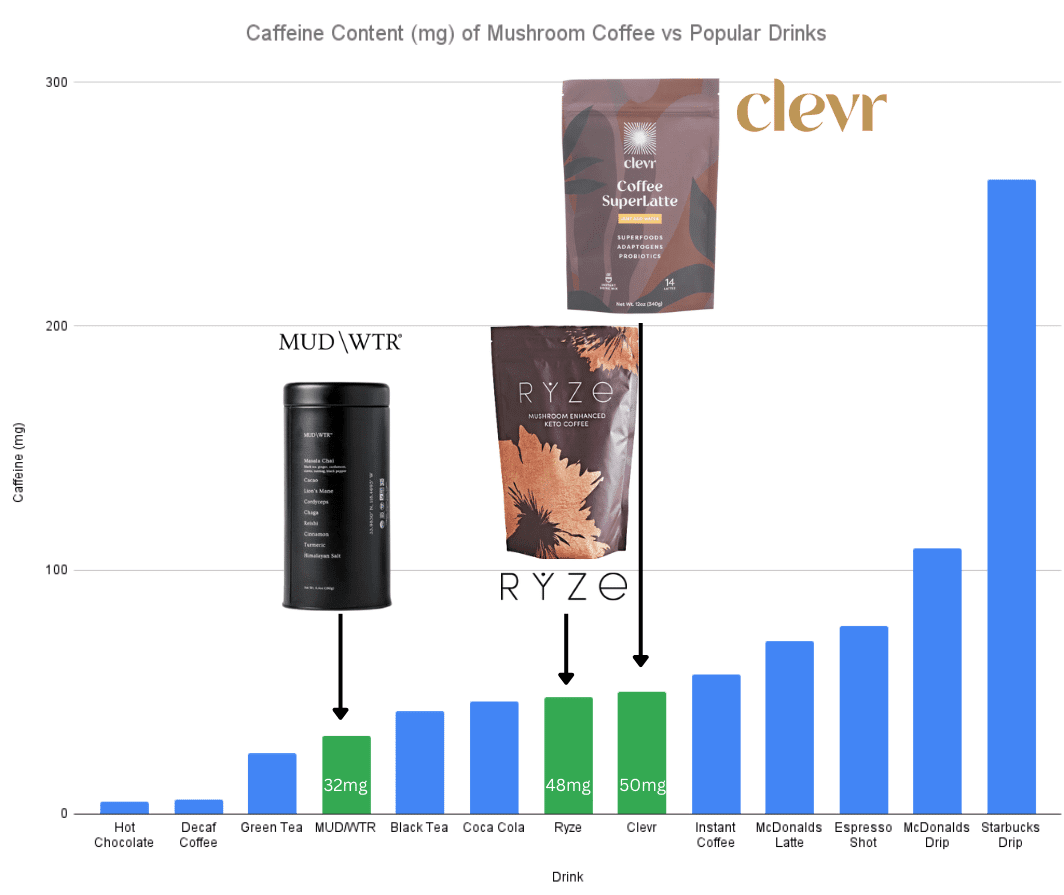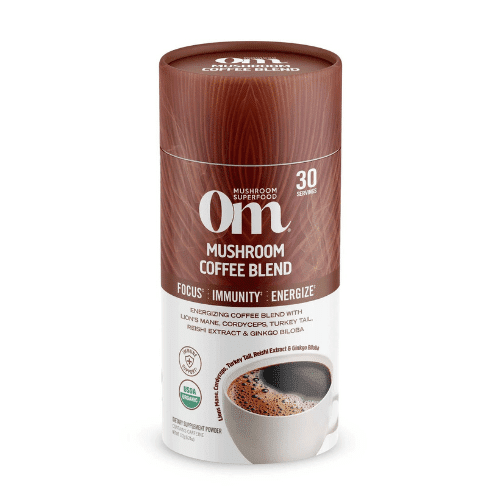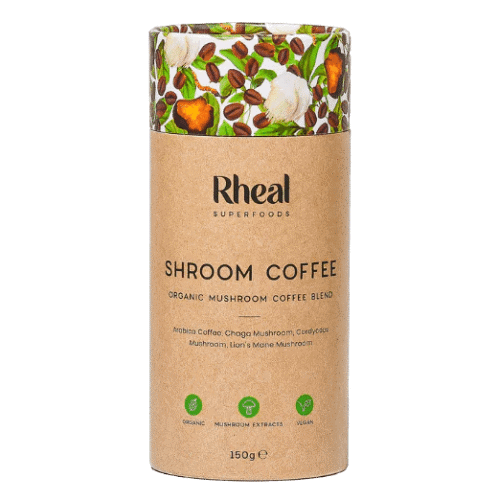Druggenius.com is reader-supported. We may earn a commission through products purchased using links on this page. Learn more about our editorial process here.
Starting your day with a cup of mushroom coffee can give a much-needed twist to your daily regimen. Many speak of its benefits, and some even prefer it to regular coffee. But given its unique blend, one might wonder, does mushroom coffee have caffeine too?
Does Mushroom Coffee Have Caffeine?
Yes, the caffeine content of mushroom coffee varies by brand but ranges from 0mg to 50mg.
This is significantly less than the caffeine content of traditional coffee and puts it in line with black tea. The brands with zero are specifically formulated as bedtime drinks, so they are closer to cocoa than coffee.

The Cons Of Caffeine
Caffeine is a natural stimulant found in coffee beans, tea leaves, cocoa beans, and other sources. When consumed, it acts on the central nervous system, boosting levels of brain activity and triggering the release of chemicals such as adrenaline and cortisol.
Drinking coffee isn’t a health sin per se. The familiar smell and flavor are almost irresistible for coffee lovers. Its benefits, like increased mental focus, boosted physical/mental energy, and even getting rid of a morning hangover, are why many people drink it regularly.
Unfortunately, they end up being dependent on coffee, which gradually evolves into an addiction, which then causes health problems. Caffeine misuse can result in dehydration, anxiety, and dizziness depending on a person’s sensitivity to caffeine and how much they consume.
Why Drink Mushroom Coffee
Here’s where coffee alternatives like mushroom coffee come into the picture. Mushroom coffee brings the classic aroma, flavor, and efficiency of a regular cup of coffee. This coffee alternative is done by drying adaptogenic mushrooms, extracting their beneficial ingredients, and adding them to coffee. Studies show they are rich in health benefits that support the body’s natural functions for immunity, stress reduction, and hormonal balance.
The most popular types of functional/medicinal mushrooms used for making this blend of coffee are:
- Chaga – A type of mushroom often used across northern Europe as a natural remedy for various ailments and served as an herbal tea. Chaga is particularly rich in anti-inflammatory and antioxidant properties, which help boost the immune system, reduce bodily inflammations, lower blood sugar levels, and improve insulin resistance.
- Cordyceps – Cordyceps is a fungus used in ancient Chinese and Tibetan herbal medicines to provide antioxidant and anti-inflammatory benefits. It helps treat conditions like respiratory problems, liver disorders, arrhythmias, high cholesterol, and even sexual problems among men.
- Lion’s mane – Lion’s mane facilitates good digestion, prevents cognitive decline (e.g., Alzheimer’s, dementia et al.), relieves symptoms of anxiety and depression, promotes faster recovery from nervous system injuries, and lowers the risk for heart disease. Aside from its medicinal use, it’s also used for cooking purposes.
- Reishi – This mushroom boosts the immune system, reduces stress, improves sleep, controls blood pressure and cholesterol levels, lessens fatigue, and is extremely beneficial to the production of estrogen and progesterone.
In terms of taste, mushroom coffee doesn’t differ much from regular coffee. Some have described it as having “earthy” or “nutty” tones and aftertaste, but in reality, many mushroom species are fairly mild in flavor, not strong enough to overpower the familiar taste of roasted coffee beans.
Is Mushroom Coffee Healthier?
Mushroom coffee is often lauded as an ideal alternative to regular coffee. During the brewing process, only a small amount of soluble fiber passes into the final beverage. The properties of the dried and milled mushroom extracts help fill in and provide more nutrients and fiber, which some studies show to support the growth of beneficial bacteria and contribute to a healthy gut microbiome. However, further research is needed to validate its properties fully.
How Much Caffeine Is In Mushroom Coffee?
One of the best things about mushroom coffee is that it has a lower caffeine content than regular coffee and is without the usual downsides like coffee jitters and energy crashes â this is because mushroom coffee blends use fewer ground coffee beans each coffee blend.
A typical 8-oz cup of regular coffee provides around 80-100 mg of caffeine, but some coffee drinks contain significantly more, like espressos or lattes, which usually contain 126 mg of caffeine per shot. Caffeine can also be found in energy drinks, soft drinks, tea, chocolate, and pain-relieving medications.
The caffeine content of mushroom coffee varies by brand but ranges from 0mg to 50mg.
We’ve gathered some of the most popular mushroom coffee brands online and listed their caffeine content, each with varying caffeine contents:
Caffeine Content for Mushroom Coffee Brands
MUD/WTR
The flagship MUD/WTR :rise contains 32mg of caffeine per 6g serving when mixed with 12 oz of water, while the nighttime variant MUD/WTR :rest product is completely caffeine-free. The ingredients in MUD/WTR make it one of the most complete mushroom coffee options on the market.
Ryze Mushroom Coffee
A cup of Ryze Mushroom Coffee contains about 48mg of caffeine, less than half the amount in a regular cup of coffee.
Four Sigmatic
A standard cup of Four Sigmatic’s mushroom coffee mix contains 50mg of caffeine. They also have a completely caffeine-free option that uses Chaga mushroom powder to provide your energy kick.
Clevr Starter Kit
Clevr comes in a few varieties, tailor-made for certain moods, and each contains varying amounts of caffeine:
- Coffee – 50 mg
- Matcha – 45 mg
- Chai – 40 mg
- Rose Cocoa – 8 mg
- Golden – 0 g
Om’s Mushroom Coffee Blend

Om’s Mushroom Coffee Blend has 120 mg of caffeine per 8 oz. serving, which is comparatively higher than most brands that tout having lesser amounts, while Om’s Mushroom Coffee Latte Blend has 116 mg of caffeine with the same 8 oz. serving.
Rheal Shroom Coffee

Rheal’s mushroom coffee blend contains only 50 mg of caffeine per serving (less than half of a regular cup of coffee) and allows more in its mushroom extract content, containing 600 mg of mushroom extract per serving.
Caffeine Content of each Mushroom Coffee Brand
| Brand | Caffeine Content (mg) |
|---|---|
| MUD/WTR | 32 |
| Ryze | 48 |
| Four Sigmatic | 50 |
| Clevr | 50 |
| Om | 120 |
| Rheal Superfoods | 50 |
Downsides Of Mushroom Coffee
When taken in excess, mushroom coffee can lead to some health problems. For example, it would not be a good alternative for people who suffer from kidney issues as mushrooms like Chaga are high in oxalates and can increase the risk of kidney stone formation.
Cordyceps mushrooms can sometimes cause mild side effects like diarrhea, constipation, and stomach troubles. Those with bleeding disorders should steer clear of them since they can slow down blood clotting and increase the risk of bleeding. Lion’s mane and reishi have also been noted to occasionally cause side effects like rashes, headaches, dizziness, itching, nausea, stomach problems, and drying mouth.
â How much caffeine is in a can of Cheerwine?
Frequently Asked Questions
Is mushroom coffee safe to drink if I’m pregnant?
So far, pregnant women have not reported any complaints or complaints after having drank mushroom coffee, so this beverage’s effects on expectant mothers haven’t been fully established yet.
But to be sure, consult your physician before making any changes to your diet during your pregnancy to avoid the risk of complications.
Can the mushroom blend in the product make me high?
No. The mushrooms used by mushroom coffee products are all functional, not psychedelics, so they can’t make you trip or go high.Â
Does mushroom coffee have any side effects?
Mushrooms should not cause serious side effects on your body since their ingredients are safe and contain less caffeine.Â
If you have type-2 diabetes or any blood-related diseases, the spices in the mushroom coffee drink could cut down your blood sugar levels and may also interact with your medications. Ideally, those with heart diseases should also take caution.
So, it’s important to consult your physician before opting for this coffee alternative.
Takeaway
With its promising health benefits and distinct taste, mushroom coffee can be a good addition to your diet to achieve optimal health. It’s an excellent substitute for those who want to avoid high amounts of caffeine and the energy crashes that come with it.
While drinking mushroom coffee offers multiple health benefits, remember that they only contain mushroom extract. Experts believe that consuming whole adaptogenic mushrooms is more recommendable to enjoy the full extent of its health benefits.
Disclaimer: this article does not constitute or replace medical advice. If you have an emergency or a serious medical question, please contact a medical professional or call 911 immediately. To see our full medical disclaimer, visit our Terms of Use page.














